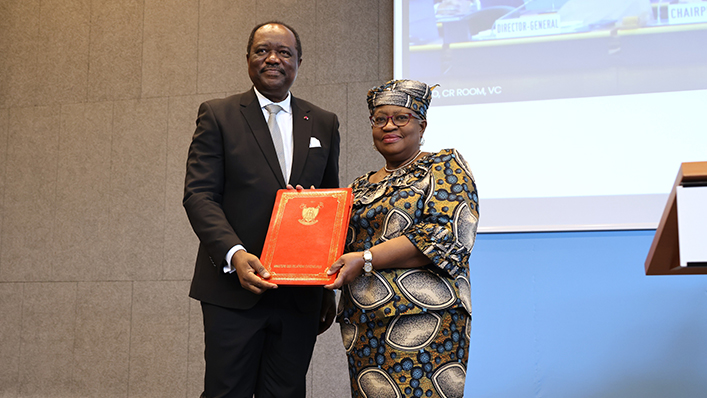
Director-General Okonjo-Iweala said: “I warmly welcome Cameroon’s formal acceptance of the WTO Agreement on Fisheries Subsidies, a critical step toward protecting our oceans and ensuring sustainable fishing practices. As the proud host of the WTO’s 14th Ministerial Conference in 2026, Cameroon is demonstrating leadership in advancing global trade and environmental sustainability. This agreement is especially vital for artisanal fishers in Cameroon and around the world, safeguarding their livelihoods by curbing harmful subsidies and preserving marine ecosystems for future generations.”
Ambassador Eheth said: “By ratifying the Agreement on Fisheries Subsidies, adopted at the 12th Ministerial Conference of the World Trade Organization, the Head of State of Cameroon, H.E. Mr Paul Biya, and the Government of the Republic reaffirm my country’s commitment to contributing to the development of the multilateral trading system, the economic prosperity of all nations, and, most importantly, the sustainable preservation of its maritime resources, particularly fisheries.”
“This decision is also a compelling testament to governance that is both relevant and geared towards the protection of the environment in all its forms, while remaining committed to developing the maritime fisheries sector. This initiative, which aligns with Cameroon’s National Development Strategy (NDS-30), further stands as a strong symbol of the country’s commitment to hosting a successful Ministerial Conference (MC14) in 2026,” he said.
Cameroon’s instrument of acceptance brings to 88 the total number of WTO members that have formally accepted the Agreement. Twenty-three more formal acceptances are needed for the Agreement to come into effect. The Agreement will enter into force upon acceptance by two-thirds of the membership.
Adopted by consensus at the WTO’s 12th Ministerial Conference (MC12), held in Geneva on 12-17 June 2022, the Agreement on Fisheries Subsidies sets new, binding, multilateral rules to curb harmful subsidies, which are a key factor in the widespread depletion of the world’s fish stocks. In addition, the Agreement recognizes the needs of developing economies and least-developed countries and establishes a fund to provide technical assistance and capacity building to help them implement the obligations.
The Agreement prohibits subsidies for illegal, unreported and unregulated (IUU) fishing, for fishing overfished stocks, and for fishing on the unregulated high seas.
Members also agreed at MC12 to continue negotiations on outstanding issues, with a view to adopting additional provisions that would further enhance the disciplines of the Agreement.
The full text of the Agreement can be accessed here. The list of members that have deposited their instruments of acceptance is available here. Information for members on how to accept the Protocol of Amendment is available here.
Share
Reach us to explore global export and import deals